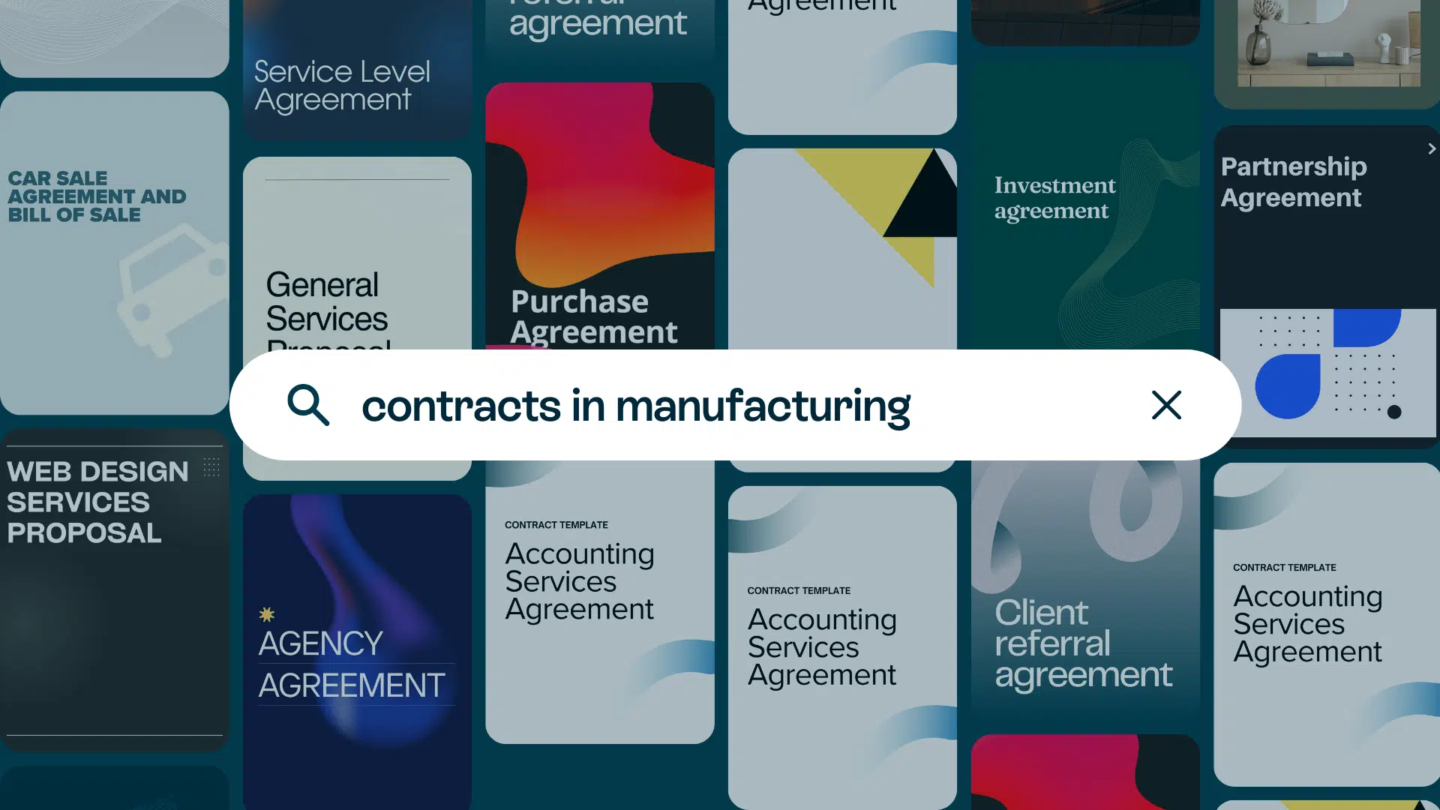Whenever you’ve signed a contract, be it for a new phone, a loan, or a car, then what you might not know is that there was an entire contracting process behind that. In fact, a lot of work goes into the contracting process, no matter the size of the contract. But what exactly is the contacting process? And how exactly does it work? Here, we’ll answer those very questions.
In this article, we’ll cover:
What are the steps in the contracting process?
What are some types of contracts that you can create a contracting process for?
What are the legal aspects of the contracting process?
How does contract management help in the contracting process?
What are the steps in the contracting process?
Work out your needs and create specifications
The first step in the contracting process is taking a look at your organisation’s needs and thinking about the requirements you’ll need to look for in potential suppliers. By clearly defining what you’re looking for, you’re already laying the groundwork for successful contract negotiations and partnerships.
When identifying needs and specifications, it’s essential to involve key stakeholders from various departments within your organisation. Their input can provide valuable insights into specific requirements and preferences that may not have been initially considered. Additionally, conducting thorough market research and analysing industry trends can help in determining the most critical needs that need to be addressed through the contracting process. Think of it this way, once you know exactly what you need, you’ll be able to find the contract management software that’s right for you – and with the average CAC on one contract being $6,900, you need to get it right.
Read also: Why Oneflow is a contract platform for everyone

Scope out potential suppliers
Once your needs are crystal clear, it’s time to embark on the search for potential suppliers. This could involve reaching out to existing contacts, conducting market research, or issuing requests for proposals. Diligently seeking out the right suppliers will lay the groundwork for a successful contractual relationship.
Exploring various channels to find potential suppliers is crucial in expanding your options and ensuring a competitive selection process. Leveraging online supplier directories, attending industry trade shows, and engaging in networking events can broaden your supplier pool and introduce you to new players in the market. Building a diverse supplier base can also enhance innovation and bring fresh perspectives to your organisation.
Evaluate proposals and choose a supplier
After receiving proposals, it’s crucial to evaluate them carefully. Consider factors such as price, quality standards, delivery timelines, and past performance. By rigorously assessing these proposals, you increase the chances of selecting the best-suited supplier for your organisation.
During the evaluation process, it’s beneficial to create a structured scoring system that weighs different criteria based on their importance to your organisation. This approach can provide a transparent and objective method for comparing proposals and making informed decisions. In addition, conducting site visits or requesting samples can offer firsthand insights into a supplier’s capabilities and help validate the information presented in their proposals.
Read also: What is contract management? Your ultimate guide

What are some types of contracts that you can create a contracting process for?
Fixed-price contracts
A fixed-price contract, as the name suggests, establishes a specific price for the goods or services provided. This type of contract provides stability and predictability, making it a popular choice for both buyers and suppliers in many industries.
Fixed-price contracts are commonly used in construction projects where the scope of work is well-defined. Both parties agree on a set price for the project, which helps in budgeting and financial planning. This type of contract incentives suppliers to complete the work efficiently and within the agreed-upon budget.
Cost-reimbursement contracts
Cost-reimbursement contracts, on the other hand, allow suppliers to be reimbursed for the costs incurred during the contract’s performance. This type of contract is often used when the scope or potential risks of a project are uncertain.
In cost-reimbursement contracts, suppliers are reimbursed for allowable costs incurred during the project, along with a fee for their services. This type of contract provides flexibility for both parties, as it allows for adjustments to the project scope and requirements as needed. However, it also requires thorough cost tracking and documentation to ensure accurate reimbursement.
Time and material contracts
Time and material contracts combine both fixed and variable pricing elements. They establish an hourly or daily rate, as well as a budget for materials. This type of contract works well when the exact requirements are difficult to predict or may change over time.
Time and material contracts are often used in consulting or software development projects where the scope of work may evolve as the project progresses. Suppliers are paid based on the hours worked and materials used, providing transparency in billing. However, this type of contract can be challenging to manage if not carefully monitored, as costs can escalate if not controlled effectively.
What are the legal aspects of the contracting process?
The key elements of a contracting process
A legal contract must contain essential elements to ensure its enforceability. These elements typically include an offer, acceptance, consideration, capacity, and mutual intent. Understanding these elements is crucial when drafting or assessing contracts to avoid any legal issues.
Offer and acceptance are fundamental components of a legal contract. An offer is a promise to do something or refrain from doing something, while acceptance is the agreement to the terms of the offer. Consideration refers to the exchange of something of value between the parties, which could be money, goods, or services. Capacity relates to the legal ability of the parties to enter into a contract, such as being of sound mind and of legal age. Mutual intent signifies that all parties must have a shared understanding and agreement about the contract’s terms.
Some common legal issues in the contracting process
Legal issues can arise during contracting, potentially leading to disputes or lawsuits. Common issues include a lack of clarity in contract terms, breach of contract, asymmetrical information, or fraudulent activities. It’s vital to have legal counsel review contracts to mitigate these risks and protect your organisation’s interests.
One prevalent legal issue in contracting is the lack of specificity and clarity in contract terms. Vague language or ambiguous clauses can lead to misunderstandings and disagreements between the parties involved. Another common problem is the breach of contract, where one party fails to fulfill their obligations as outlined in the agreement. This breach can result in financial losses and damage to business relationships.
Read also: Why half of businesses are seeing how AI can aid risk and compliance management

How does contract management help in the contracting process?
Contract management software
Contract managers play a vital role in overseeing the entire contracting process. They act as liaisons between stakeholders, ensuring adherence to contract terms, managing relationships, and monitoring contract performance. Their expertise and attention to detail are instrumental in driving successful outcomes.
Furthermore, contract managers are responsible for conducting risk assessments, identifying potential issues, and developing strategies to mitigate risks. They also play a key role in negotiating contract terms and conditions, ensuring that all parties involved are in agreement and understand their obligations. By proactively addressing challenges and fostering effective communication, contract managers contribute to the overall success of the contracting process.
Which features should you keep an eye out for?
Effective contract administration is essential to ensure smooth implementation and compliance. Tasks such as monitoring contractor performance, managing changes and disputes, and maintaining proper documentation fall within this realm. By prioritising contract administration, organisations can maximise the value derived from their contracts.
In addition to the aforementioned tasks, contract administration also involves ensuring that all parties comply with relevant laws and regulations. Contract managers must stay updated on legal requirements and industry standards to avoid potential legal disputes or breaches. By staying informed and proactive, contract managers can uphold the integrity of the contracting process and protect the interests of all stakeholders involved.
The key takeaways
In conclusion, understanding the contracting process is crucial for any business or professional seeking to engage in mutually beneficial agreements. From the basics to the crucial steps, contract types, legal aspects, and contract management, each element plays a vital role in ensuring smooth and successful business relationships. By mastering the contracting process, you’ll be better equipped to safeguard your interests and build sustainable partnerships.







